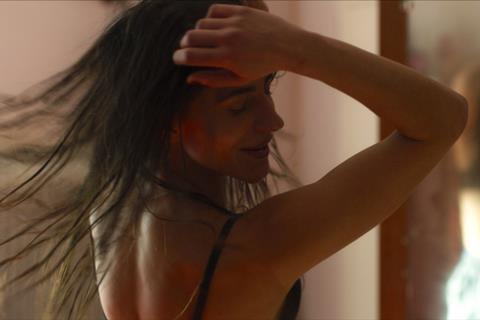Asimina Proedrou’s Thessaloniki award-winning debut follows three members of a family on the Greek/North Macedonian border

Dir: Asimina Proedrou. Greece, Germany, North Macedonia. 2022. 118mins
The real-life 2015 refugee crisis on the Greek/North Macedonian border is observed through the prism of a single family in Asimina Proedrou’s intriguing and deft debut. Beginning with a tragic find by children at a lakeside on a day of local celebration, an event that the film loops back to, Proedrou breaks her narrative into three Rashomon-style shards, each revealing a different facet of the tale. Initially appearing like a straightforward refugee drama, Behind The Haystacks becomes an intense psychological study of murky morality, ingrained community animosity to outsiders and the lengths people will go to for self-preservation.
Proedrou’s approach may be lyrical but it’s also economical
Although firmly rooted in a specific place, its oblique take on a hot-button issue and complex plot that only gradually gives up its secrets could easily catch the attention of arthouse distributors elsewhere in the world after its world premiere in the Meet The Neighbours competition of Thessaloniki Film Festival, where it won several gongs including a Special Mention and the Hellenic Broadcasting Association award.
The story that informs all the others is that of fisherman Stergios (Stathis Stamoulakatos), which is fitting for a bear of a man who also looms large over everyone he meets and, especially, his family. He, his wife Maria (Lena Ouzounidou) and their daughter Anastasia (newcomer Evgenia Lavda in an impressive debut) live on the side of the Doiran Lake, which has one shore in North Macedonia and the other in Greece.
That Stergios is emotionally controlling is evident in the way Maria scurries about in his presence. Anastasia is also outwardly obedient. He treats her more like a child than the young woman she is, insisting on driving her nursing job at the hospital and refusing to let her go for a night out in nearby Kiklis without a chaperone. He intensely dislikes his brother-in-law (Paschalis Tsarouhas) for historic reasons that, ironically, also lead him to becoming involved in a nefarious scheme to transport refugees across the lake. This latest enterprise is, unfortunately for Stergios, not the only thing that won’t end well for him.
Proedrou – who includes audaciously symbolic flourishes at the start of each of her three main chapters – then takes a different tack, to consider the situation through the eyes of the devotely religious Maria. The one area of her life where she could be considered to have power is in her local Greek Orthodox Church, where she is trusted by the priest to keep the keys to the place for cleaning duties and to organise the collection for restoration funds. She finds it hard to tread the church line that it is “sinful to help” the refugees, however, when she is confronted with their harsh reality.
The third chapter, centring on Anastasia’s gradual rebellion from her father unfolds, like the others, in elliptical fashion, occasionally brushing on moments we have already seen while filling in the blanks more generally. It’s a canny move by Proedrou who keeps us on the hook and fishing for clues as the full picture finally pulls into focus with a satisfying snap.
The characterisation is also compelling as each of the three family members is emotionally volatile in a different way, so that we’re never sure who or what will trigger whom. Initimacy is generated by camerawork from Simos Sarketzis as it leans in to observe the family in their most private moments. He also gets emotional mileage from magic hour and half-light shots, particularly near the lake.
Proedrou’s approach may be lyrical but it’s also economical, suggesting connection through the universal ‘language’ of rock, paper scissors, or a mother’s haltingly sung lullaby. The music in general is driven by traditional folk tunes that, beyond their evocation of place, suggest traditions that people are prepared to defend at almost any cost By the end, we realise that while the refugees are trapped by circumstance, the hell in which Stergios finds himself is one into which he willingly danced.
Production companies: Argonauts Productions, Fiction Park, Sektor Film
International sales: Argonauts Productions ibolomyti@argonautsproductions.gr
Producers: Ioanna Bolomyti, Markus Halberschmidt, Vladimir Anastasov, Angela Nestorovska
Cinematography: Simos Sarketzis
Production design: Edouard Georgiou
Editing: Elektra Venaki
Music: Marios Strofalis
Main cast: Stathis Stamoulakatos, Lena Ouzounidou, Evgenia Lavda, Christos Kontogeorgis, Dina Mihailidou, Paschalis Tsarouhas






![The Brightest SunScreen[Courtesy HKIFF]](https://d1nslcd7m2225b.cloudfront.net/Pictures/274x183/3/5/0/1448350_thebrightestsunscreencourtesyhkiff_312678.jpg)















![The Brightest SunScreen[Courtesy HKIFF]](https://d1nslcd7m2225b.cloudfront.net/Pictures/100x67/3/5/0/1448350_thebrightestsunscreencourtesyhkiff_312678.jpg)

